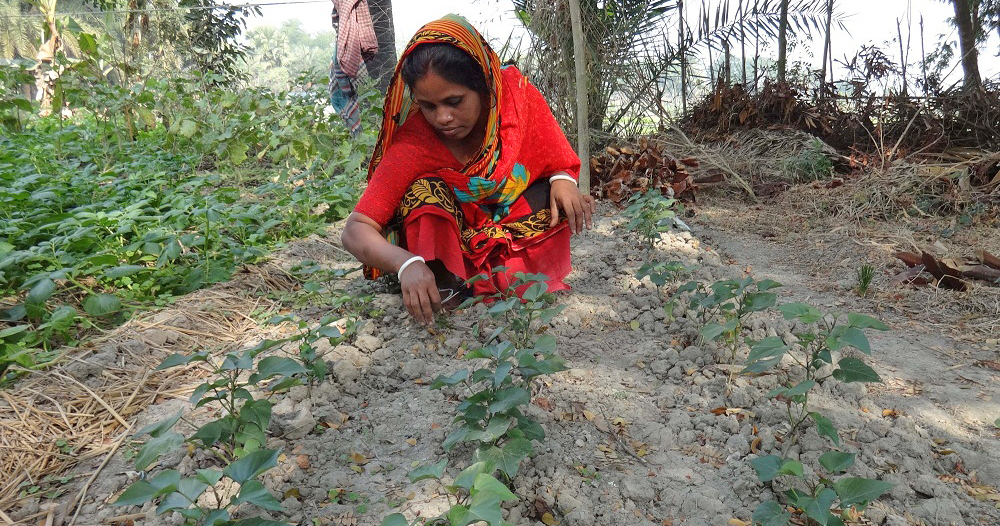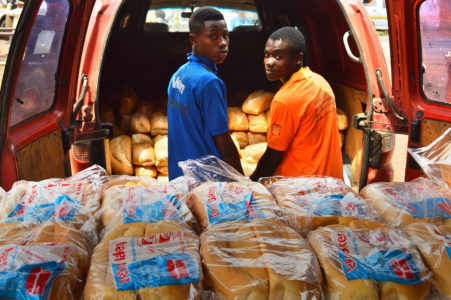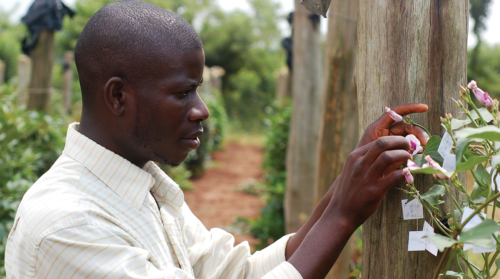
Bangladesh’s fertile delta soils are suffering from increasing salinization, which threatens the lives and livelihoods of farmers and other inhabitants. This project helps increase farmers’ access to improved, salt-tolerant varieties of potato and sweetpotato, diversifying their production, and boosting their food security, nutrition, and climate resilience.
Background
Asia’s fertile river deltas—home to more than 400 million people—have traditionally provided a vital resource to feed the growing population through the cultivation of high-input rice production systems. However, during the past decade, this important environment has experienced severe degradation due to rising sea levels, falling inland water tables, and increasing temperatures.The resulting soil salinization has reduced rice yields, threatening the food security of millions. Bangladesh is one of the worst affected areas, with more than 40% of total arable land already affected with reductions in rice yields of up to 9% predicted. Furthermore, a high proportion of the population suffer from malnutrition which is likely to be exacerbated by falling productivity.
Root and tuber crops could make an important contribution to closing the food gap. These crops also provide important vitamins and minerals missing from a rice-based diet. Orange-fleshed sweetpotato is particularly valuable since it provides a rich source of vitamin A—necessary to support healthy growth in children. However, potato and sweetpotato are grown currently on less than 5% of arable land and the common varieties have low tolerance for salt and heat. This project builds on earlier work by the International Potato Center (CIP) to breed improved potato and sweetpotato varieties—with better disease resistance, and tolerance to salt and heat—that are suitable for release to farmers in Bangladesh.
Objectives
- Increase agricultural productivity, improve food security and provide healthier diets for families living in the delta region of Bangladesh through increasing adoption of salt-tolerant and nutritious potato and sweetpotato.
- Develop the capacity of the national agricultural research system.
Approach
The project will strengthen farmer access to, and use of, improved, salt-tolerant varieties of potato and sweetpotato in two districts of the southern delta. It will also work to improve the capacity of the national agricultural research system (NARS) for continued varietal development and adaptation to local needs and preferences.
The four main activities encompass: a) supporting the NARS to adopt accelerated breeding methods and evaluation tools; b) providing training to partners to promote more efficient multiplication and marketing of planting materials; c) conducting participatory selection of potato and sweetpotato varieties, and enhancing the agronomic practices best accepted by farmers; and d) promoting adoption of orange-fleshed sweetpotato through nutrition education.
Aligned with the Bangladeshi government priorities to diversify agriculture to improve food security and nutrition and build climate-change resilience, the project contributes to gender equity through the facilitation of women’s control over resources. It also helps build a stronger evidence base on gender-sensitive approaches to agricultural innovation in Southeast Asia.
Achievements and expected outcomes
CIP began working in Bangladesh in 1988 and this work has led to the release of 13 new potato and 8 sweetpotato varieties. More recent work has focused on identifying which of these have the best traits for Bangladeshi farmers, including resistance to diseases and tolerance to drought, heat and salt. Additional support from CIP has helped develop seed production facilities, improve post-harvest storage, and promote marketing strategies. Earlier CIP projects have reached over 100,000 farmers with quality potato and sweetpotato planting materials, as well as providing training on commercial vegetable production, integrated pest management, and nutrition education.
This project supports the Bangladesh Agricultural Research Institute in breeding new varieties of vitamin A-rich salt-tolerant sweetpotato, and iron- and zincrich potato. Farmers will also gain better access to these improved varieties through development of a more efficient seed value chain, with a goal of 5% of households in the target area having improved access. Six communities will be selected for participatory variety selection trials, representing different cropping patterns and management practices. This should result in at least 5,000 farmers planting and assessing the improved varieties.
Experience shows that adoption rates of new crops and varieties are greatest when agricultural extension is linked with nutrition education. The project, therefore, includes training for 50 community nutrition scholars. This should lead to some 25,000 individuals adopting improved diets, with efforts focused on households with young children. The nutrition education component of the project seeks to increase demand for potato and sweetpotato among non-farming families.
Key outputs
| Target | |
| Households adopting improved, salt-tolerant varieties | 5,000 |
| Individuals having more nutritious diets | 25,000 |
| Individuals benefiting indirectly from improved diets and incomes | 37,500 |
| Hectares under improved varieties and better management practices | 100 |
Contact
Ebna Habib Md Shofiur Rahaman
CIP, Bangladesh
e.rahaman@cgiar.org
Thanks to our donors



